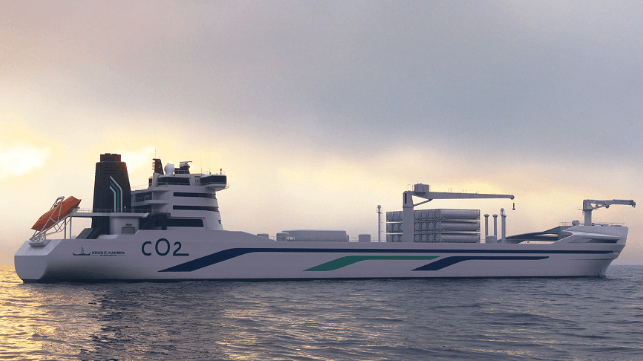Knud E. Hansen Releases Design for Efficient, DP-Enabled CO2 Carrier

Knud E. Hansen has entered the race to design a new class of vessel - the CO2 carrier. As Europe moves to decarbonize shoreside industries like concrete, ammonia and methanol production, carbon capture and storage will play an increasing role, and new ships will be required to transport the CO2 from the point of origin to the subsea wells where it is injected and stored.
The Danish naval architect's design is intended for offshore operations, and is fitted for DP-2 dynamic positioning. It would have storage tanks, transfer equipment for offloading and a heating system for bringing the gas up to temperature for subsea injection (if needed).
Uniquely, Knud E. Hansen's design has a twin-skeg, contra-rotating propeller system for propulsion, with four props in total at the stern: two fixed drive units facing aft and two azimuthing drives facing forward. According to the firm, this arrangement would provide considerable savings on fuel and contribute to station-keeping performance.

Courtesy Knud E. Hansen
A counter-rotating propeller system of similar design has the potential to improve fuel economy by up to eight percent, according to a study carried out by P.C. van Kluijven of Rotterdam Mainport University in 2014. Counter-rotating propellers are rarely encountered in commercial maritime, but can be found in special-purpose applications like double-ended azimuthing pods.

that matters most
Get the latest maritime news delivered to your inbox daily.
The CO2 carrier concept is beginning to gather interest as subsea carbon-storage projects take shape. At the end of March, Mitsubishi Shipbuilding launched the world's first CO2 carrier demonstration vessel, a 240-foot testbed ship built with technology from LNG and LPG carriers. Sanyu Kisen is the owner of the newbuild, and the ship will be chartered to the Engineering Advancement Association of Japan (ENAA) for testing purposes.
In China, CSSC subsidiary Dalian Shipbuilding Industry Co. (DSIC) is building the world's first purpose-built CO2 carriers for commercial service. The groundbreaking ships were ordered by Northern Lights, the Norwegian subsea CO2 storage venture run by Equinor, Shell and TotalEnergies. Each will be about five times larger than Mitsubishi's test vessel. "K" Line - a participant in the Mitsubishi/Sanyu Kisen test project - will be operating the commercial-scale newbuilds under charter for Northern Lights.
